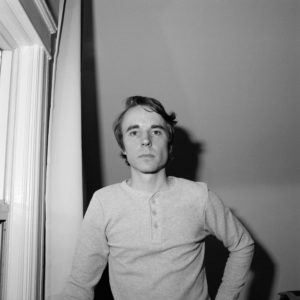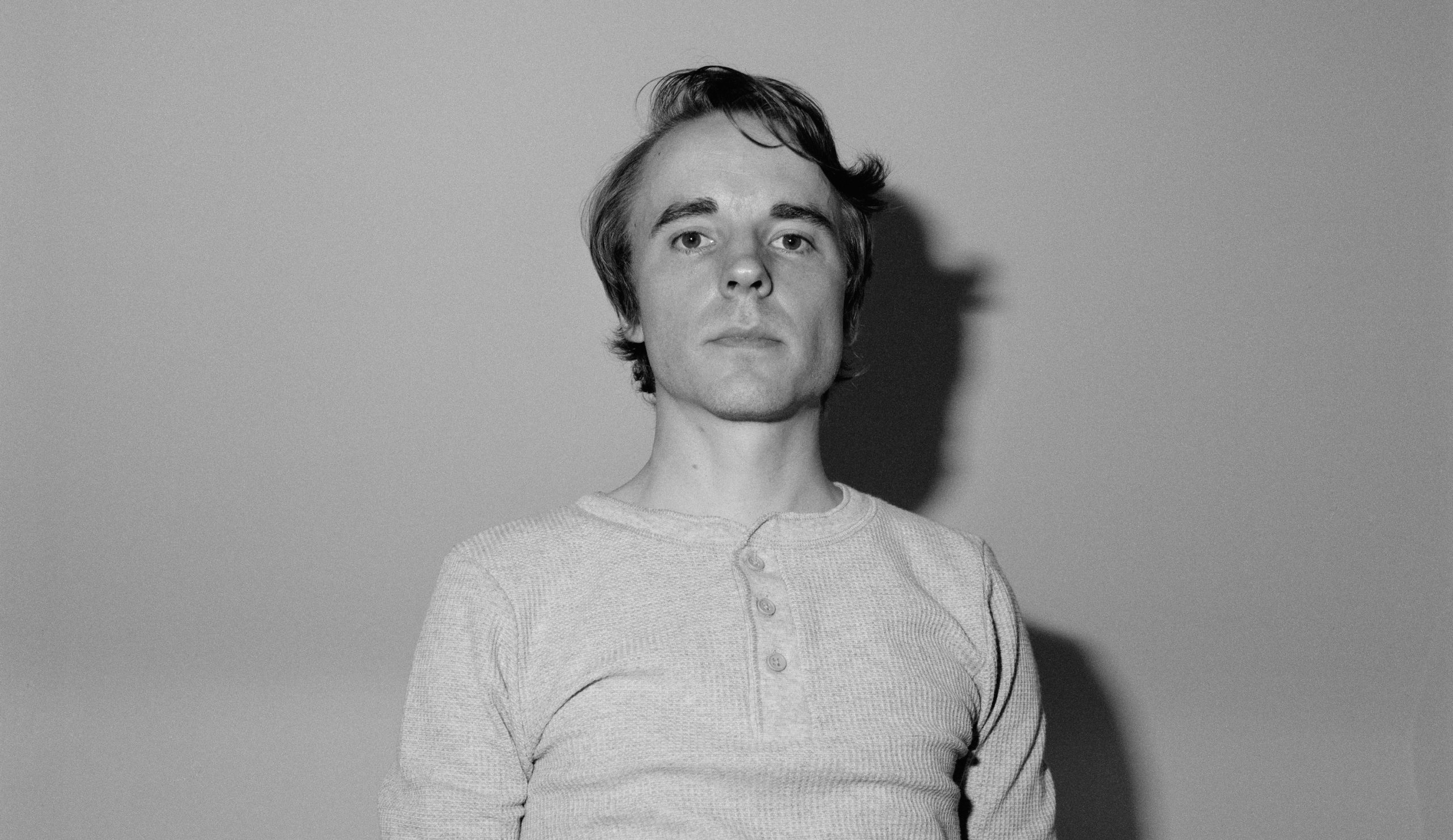Whether or not it’s the intention of the creator, art can show us the rawest version of ourselves. It can peel back the layers and have us looking deeper in the mirror, past the imperfections of our reflection. Such was the case with Saskatchewan-born musician Andy Shauf and his 2020 album The Neon Skyline. For his fifth record, the prolific storyteller built a concept album around a local bar and a group of friends. His detailed writing created a world that was fictional yet lifelike—a commonplace background fleshed out with the too-familiar cringe scenario of encountering an ex on a night out. But chatting with Shauf it’s clear that he’s still navigating his own role within these lyrics. “I hope that people don’t think I’m narrating as myself—it’s essentially just me processing certain things and using my own lens as the filter for a reaction,” he says. “It’s me picturing myself in those shoes.”
A few weeks ago, Shauf released the follow-up to Skyline, which is an extension of that world. Written during the same period, Wilds is a batch of songs that Shauf escaped into in order to return to the concept on Skyline. Whereas the latter gave us a detailed look at the tension of running into an ex lover, Wilds is a bit less specifically focused. It both zooms in on the character of the ex, Judy, and gives a deeper context for why the main relationship from Skyline failed. Released the same week it was announced, Wilds is rawer and off the cuff. It was recorded on a small tape machine in Shauf’s Toronto studio. The vocals are fuzzier and the arrangements are less ambitious.
But it’s not only the lo-fi compositions from Wilds that give us the sense that Shauf is peeling back the layers a bit. This nine-track album is closing out a period that Shauf describes as “feeling pretty lost.” And it wasn’t his initial plan to expose the similarities between this narrative’s chaos and his own life. He sounds secure but still a little apprehensive of the intense vulnerability. “With a year and a half to think on, I came to the conclusion that Skyline wasn’t really how I wanted to leave that period of my life.” I comment that his tone suggests he’s in a much better place. “I’ve had a lot of time over this lockdown period to think and assess how my life’s been going,” he says. “I’ve started in a new direction. It’s positive. Coinciding with this release of Wilds and feeling like it’s time to put some of this shit behind.”
I was surprised when I heard about this album because there wasn’t any build up to it. Why did you take that approach?
We’re always taking so much time leading up to the release of something and showing little pieces of it and I wanted to put it all out at once. The label I don’t think really loved that idea, so we ended up releasing a single first, and then the second single. I thought it would be cool to have a surprise release since it’s not really a conventional album. These songs are essentially B-sides to Skyline. They’re cohesive in that I used the shitty-sounding tape machine to make all of them. I knew that they weren’t going to make the record that eventually became Skyline, but there was something to them that was so raw.
“I’ve always thought that you need to have a massive capacity to write a longer story, but what I wasn’t realizing is that you can expand your capacity by just being organized.”
Do you think of yourself as a storyteller or a songwriter first?
I like trying to come up with a way to tell a story in a few words and a few syllables. It’s a nice problem to try and solve. I’ve never really tried to write anything without music story-wise. I think it’s something that I want to try doing in the future. I’ve been having small breakthroughs in my mind with how writers actually construct stories. I’ve been trying to learn a little bit more about other people’s processes, writing in small chunks to assemble a bigger piece. When I was writing Skyline, I was doing it in a really silly way. I didn’t have my story idea fully fleshed out. I would try to write a song and pull the story in a certain direction, and I would come to a dead end and I would have to scrap a bunch of songs and go back and try to write myself into another scenario that eventually would lead me down a different road. It was just really wasteful. It never occurred to me that I could go back and rewrite, and try to work on a bulk of songs together to try and craft something more cohesive.
What specific writers were you looking at? Can you expand on those breakthroughs?
Well, specifically the writers were Quentin Tarantino and George Saunders talking on podcasts about their processes. It’s kind of hard to explain what the breakthrough really is…it’s like I’ve always thought that you need to have a massive capacity to write a longer story, but what I wasn’t realizing is that you can expand your capacity by just being organized.

There’s lots of mentions of the past or of not being able to stick in the present on Wilds. Was that a subconscious thing that arose with those songs?
There’s a lot of looking back and regret in the songs. I think there are definitely songs on this collection that I wrote with myself clearly in mind. It’s a lot to do with booze-filled regrets. A lot of these songs didn’t make the record because I felt they were a little heavy-handed, or they were getting into a territory where if people assumed I was the narrator of the songs…I felt like I was painting myself in too honest of a light, maybe. Like “Wicked and Wild” is one where I’m writing about myself being a shithead. This is definitely a lot of songs looking back on something that’s unpleasant and a way of living this unsustainable life.
“I think the narrator of Skyline is stuck in a loop of repeated mistakes and ignoring the root of his problems, and it took me stepping out of the loop I was caught in to realize that mine was just as destructive, and that I was ignoring it in the same ways.”
That’s the struggle with putting art out into the world—it’s such a naked way of letting people see that side of you. But then it’s also kind of the unifying element of art.
It’s funny being on the road and playing a lot of these songs live. We’re still playing a lot of Skyline songs. Thinking about the first song on that record and then “Clove Cigarette”—there’s hints in that record where it’s pointing to the story of the narrator and Judy and this relationship that fell apart. That record is a bunch of songs where the narrator says “I don’t have a drinking problem.” Then on this record, Wilds, there’s a lot of songs that recognize that this is unsustainable and this is happening because of drinking. It wasn’t my intention to totally deny a drinking problem on Skyline, but I think with Wilds it’s a clearer view of why this shit fell apart. It mirrors my life a little bit. There was a lot of denial around that with myself in the Skyline timeline. Now, here we are.
When did you realize that certain parts of these songs mirrored certain personal aspects?
I think I knew all along that these songs mirrored my life in certain ways, but I assumed I was writing about someone with bigger problems than my own. I think the narrator of Skyline is stuck in a loop of repeated mistakes and ignoring the root of his problems, and it took me stepping out of the loop I was caught in to realize that mine was just as destructive, and that I was ignoring it in the same ways.
How does it feel to tour these songs and revisit them after not being able to tour?
It feels great to be on the road again and playing for people and trying to soak it in a little bit more than I have in the past. It’s funny to be doing a tour—this is my first tour where I’m not drinking on the road. Every song that we sing is about drinking, so there’s a weirdness to it. But it’s also like looking back at a different person. It’s interesting because these songs were never meant to be super personal, but now that I’ve played them with a little more perspective, there’s a disconnect for myself that happens. I’ve become an observer of someone acting very foolishly.
“These songs were never meant to be super personal, but now that I’ve played them with a little more perspective, there’s a disconnect for myself that happens. I’ve become an observer of someone acting very foolishly.”
I’m sure it must also be validating in a weird way to be singing songs that clearly don’t glorify drinking.
I hope that it comes across that it’s not a consequence-free life kind of thing. But the amount of times I mention cigarettes in a song—smoking is so bad and I feel like I’ve promoted it for many years. It’s weird to have to deal with that [laughs].
One final question I had about the album was the ending and the choice to leave it on a question—asking “Is it all OK, Judy?”
I feel like that’s kind of how life is—you can never know if it’s OK. Even if you make amends with someone, life still only happens inside of our minds and for ourselves. So you can be reassured and try to make sure that things are OK, but you just have your own perspective. I think that that’s as good of a result as you can ever get in this relationship where it’s wrecked by poor decisions. At the end, when it’s not the heat of the moment anymore and you’re just looking back on it, you can only really be half assured that anything really stuck. Nothing is certain, ever. Who knows if Judy is OK? Her toe is not OK. FL







